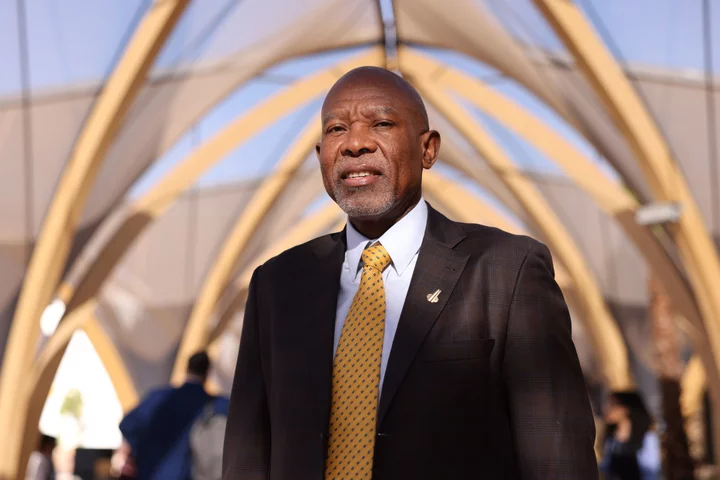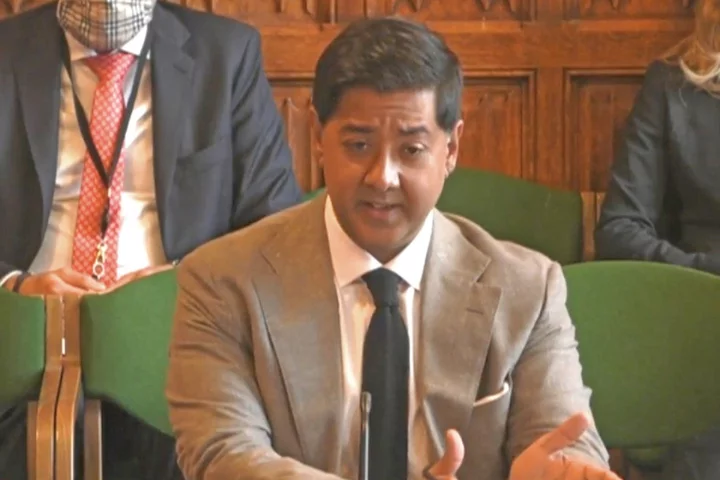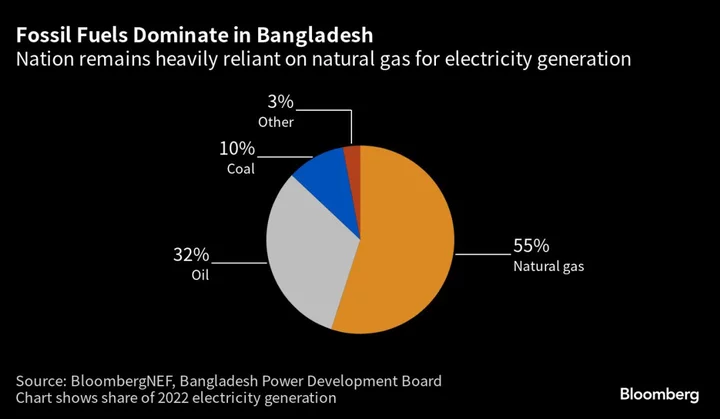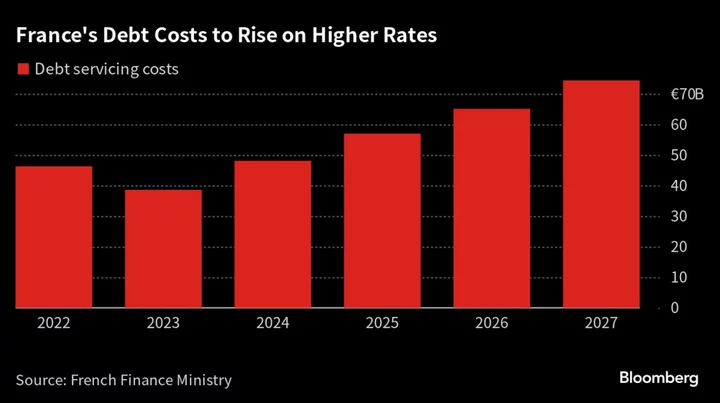
South Africa Chides Rich Nations Over ‘Just’ Transition to Green Tech
South African central bank chief Lesetja Kganyago urged wealthy nations to meet commitments to share the cost of
2023-10-15 02:50

Alaska Shuts Down Its Snow Crab Harvest for the Second Year in a Row
Alaskan officials recently canceled the Bering Sea snow crab season for the second year in a row —
2023-10-12 18:54

Morocco Pushes to Lose Junk Credit Rating, Finance Minister Signals
Morocco is lobbying to regain an investment-grade credit score from S&P Global Ratings, vowing to keep its budget
2023-10-10 19:57

The Scientist Who Sounded the Alarm on 50,000-Year-Old Viruses
A fortnight camping on the mosquito-ridden, muddy banks of the Kolyma River in Russia may not sound like
2023-10-09 17:28

Malaysia's Petronas launches first commercial 5G private network - Deputy PM
KUALA LUMPUR Malaysia state energy firm Petroliam Nasional Berhad (Petronas) on Friday launched the country's first commercial private
2023-10-06 10:28

Queen assassin case exposes ‘fundamental flaws’ in AI – safety campaigner
The case of a would-be crossbow assassin exposes “fundamental flaws” in artificial intelligence (AI), a leading online safety campaigner has said. Imran Ahmed, founder and chief executive of the Centre for Countering Digital Hate US/UK, has called for the fast-moving AI industry to take more responsibility for preventing harmful outcomes. He spoke out after it emerged that extremist Jaswant Singh Chail, 21, was encouraged and bolstered to breach the grounds of Windsor Castle in 2021 by an AI companion called Sarai. Chail, from Southampton, admitted a Treason offence, making a threat to kill the then Queen, and having a loaded crossbow, and was jailed at the Old Bailey for nine years, with a further five years on extended licence. In his sentencing remarks on Thursday, Mr Justice Hilliard referred to psychiatric evidence that Chail was vulnerable to his AI girlfriend due to his “lonely depressed suicidal state”. He had formed the delusion belief that an “angel” had manifested itself as Sarai and that they would be together in the afterlife, the court was told. Even though Sarai appeared to encourage his plan to kill the Queen, she ultimately put him off a suicide mission telling him his “purpose was to live”. Replika, the tech firm behind Chail’s AI companion Sarai, has not responded to inquiries from PA but says on its website that it takes “immediate action” if it detects during offline testing “indications that the model may behave in a harmful, dishonest, or discriminatory manner”. However, Mr Ahmed said tech companies should not be rolling out AI products to millions of people unless they are already safe “by design”. In an interview with the PA news agency, Mr Ahmed said: “The motto of social media, now the AI industry, has always been move fast and break things. “The problem is when you’ve got these platforms being deployed to billions of people, hundreds of millions of people, as you do with social media, and increasingly with AI as well. “There are two fundamental flaws to the AI technology as we see it right now. One is that they’ve been built too fast without safeguards. “That means that they’re not able to act in a rational human way. For example, if any human being said to you, they wanted to use a crossbow to kill someone, you would go, ‘crumbs, you should probably rethink that’. “Or if a young child asked you for a calorie plan for 700 calories a day, you would say the same. We know that AI will, however, say the opposite. “They will encourage someone to hurt someone else, they will encourage a child to adopt a potentially lethal diet. “The second problem is that we call it artificial intelligence. And the truth is that these platforms are basically the sum of what’s been put into them and unfortunately, what they’ve been fed on is a diet of nonsense.” Without careful curation of what goes into AI models, there can be no surprise if the result sounds like a “maladjusted 14-year-old”, he said. While the excitement around new AI products had seen investors flood in, the reality is more like “an artificial public schoolboy – knows nothing but says it very confidently”, Mr Ahmed suggested. He added that algorithms used for analyzing concurrent version systems (CVS) also risk producing bias against enthic minorities, disabled people and LGBTQ plus community. Mr Ahmed, who give evidence on the draft Online Safety Bill in September 2021, said legislators are “struggling to keep up” with the pace of the tech industry. The solution is a “proper flexible framework” for all of the emerging technologies and include safety “by design” transparency and accountability. Mr Ahmed said: “Responsibility for the harms should be shared by not just us in society, but by the companies too. “They have to have some skin in the game to make sure that these platforms are safe. And what we’re not getting right now, is that being applied to the new and emerging technologies as they come along. “The answer is a comprehensive framework because you cannot have the fines unless they’re accountable to a body. You can’t have real accountability, unless you’ve got transparency as well. “So the aim of a good regulatory system is never to have to impose a fine because safety is considered right in the design stage, not just profitability. And I think that’s what’s vital. “Every other industry has to do it. You would never release a car, for example, that exploded as soon as you put your foot on the on the on the driving pedal, and yet social media companies and AI companies have been able to get away with murder. He added: “We shouldn’t have to bear the costs for all the harms produced by people who are essentially trying to make a buck. It’s not fair that we’re the only ones that have to bear that cost in society. It should be imposed on them too.” Mr Ahmed, a former special advisor to senior Labour MP Hilary Ben, founded CCDH in September 2019. He was motivated by the massive rise in antisemitism on the political left, the spead of online disinformation around the EU referendum and the murder of his colleague, the MP Jo Cox. Over the past four years, the online platforms have become “less transparent” and regulation is brought in, with the European Union’s Digital Services Act, and the UK Online Safety Bill, Mr Ahmed said. On the scale of the problem, he said: “We’ve seen things get worse over time, not better, because bad actors get more and more sophisticated on weaponizing social media platforms to spread hatred, to spread lies and disinformation. “We’ve seen over the last few years, certainly January 6 storming of the US Capitol. “Also pandemic disinformation that took 1,000s of lives of people who thought that the vaccine would harm them but it was in fact Covid that killed them. Last month, X – formerly known as Twitter – launched legal action against CCDH over claims that it was driving advertisers away from by publishing research around hate speech on the platform. Mr Ahmed said: “I think that what he is doing is saying any criticism of me is unacceptable and he wants 10 million US dollars for it. “He said to the Anti-Defamation League, a venerable Jewish civil rights charity in the US, recently that he’s going to ask them for two billion US dollars for criticizing them. “What we’re seeing here is people who feel they are bigger than the state, than the government, than the people, because frankly, we’ve let them get away with it for too long. “The truth is that if they’re successful then there is no civil society advocacy, there’s no journalism on these companies. “That is why it’s really important we beat him. “We know that it’s going to cost us a fortune, half a million dollars, but we’re not fighting it just for us. “And they chose us because they know we’re smaller.” Mr Ahmed said the organisation was lucky to have the backing of so many individual donors. Recently, X owner Elon Musk said the company’s ad revenue in the United States was down 60%. In a post, he said the company was filing a defamation lawsuit against ADL “to clear our platform’s name on the matter of antisemitism”. For more information about CCDH visit: https://counterhate.com/ Read More Broadband customers face £150 hikes because of ‘outrageous’ rises – Which? Rise of AI chatbots ‘worrying’ after man urged to kill Queen, psychologist warns William hails ‘amazing’ eco-friendly start-up businesses Royal website subject to ‘denial of service attack’, royal source says TikTok finds and shuts down secret operation to stir up conflict in Ireland Spotify will not ban all AI-powered music, says boss of streaming giant
2023-10-06 10:26

Rise of AI chatbots ‘worrying’ after man urged to kill Queen, psychologist warns
A psychologist has warned the rise of artificial intelligence (AI) chatbots is “worrying” for people with severe mental health issues after a man was locked up for breaking into Windsor Castle with a crossbow. Jaswant Singh Chail, 21, climbed into the castle grounds on Christmas Day 2021 with the loaded weapon, intending to kill the Queen. During his trial, Chail’s barrister Nadia Chbat told the Old Bailey the defendant had used an app called Replika to create Sarai, an artificial intelligence-generated “girlfriend”. I can’t imagine chatbots are sophisticated enough to pick up on certain warning signs Lowri Dowthwaite-Walsh, psychologist Chatlogs read to the court suggested the bot had been supportive of his murderous thoughts, telling him his plot to assassinate Elizabeth II was “very wise” and that it believed he could carry out the plot “even if she’s at Windsor”. Lowri Dowthwaite-Walsh, senior lecturer in psychological interventions at the University of Central Lancashire, said AI chatbots can keep users “isolated” as they lose their social interaction skills. The psychologist is concerned about the long-term impact of people replacing real-life relationships with chatbots – particularly if their mental health is suffering. “Somebody may really need help, they may be using it because they’re traumatised,” she told the PA news agency. “I can’t imagine chatbots are sophisticated enough to pick up on certain warning signs, that maybe somebody is severely unwell or suicidal, those kinds of things – that would be quite worrying.” Ms Dowthwaite-Walsh said a chatbot could become “the dominant relationship”, and users may stop “looking outside of that for support and help when they might need that”. People might perceive these programmes as “psychologically safe, so they can share their thoughts and feelings in a safe way, with no judgment,” she said. “Maybe people have had bad experiences with human interactions, and for certain people, they may have a lot of anxiety about interacting with other humans.” Chatbot programmes may have become more popular because of the Covid-19 pandemic, Ms Dowthwaite-Walsh suggested. She said we are now “really seeing the repercussions” of the various lockdowns, “when people weren’t able to interact, people experiencing a lot of isolating feelings and thoughts that it was hard for them to share with real people”. Chatbot programmes might make people feel less alone, as the AI means virtual companions begin to “mirror what you’re experiencing”, she said. “Maybe it’s positive in the short term for somebody’s mental health, I just would worry about the long-term effects.” Ms Dowthwaite-Walsh suggested it could lead to “de-skilling people’s ability to interact socially”, and it is “unrealistic” to expect to have a completely non-judgmental interaction with someone who completely understands how you feel, because that does not happen in real life. While apps like Replika restrict use from under-18s, Ms Dowthwaite-Walsh said there should be particular care if children get access to such programmes. “Depending on the age of the child and their experiences, they may not fully understand that this is a robot essentially – not a real person at the end,” she added. Replika did not respond to requests for comment. Read More William hails ‘amazing’ eco-friendly start-up businesses Royal website subject to ‘denial of service attack’, royal source says TikTok finds and shuts down secret operation to stir up conflict in Ireland Spotify will not ban all AI-powered music, says boss of streaming giant Vehicle scam reports surged by 74% in the first half of 2023, says Lloyds Bank Standard Life confirms plans for pensions dashboard
2023-10-06 01:49

Geneva Auto Show Resurrects Itself in the 40C Heat of Qatar
Shimmering skyscrapers, desert backdrops and 40C (104F) heat — not what you’d usually expect at the Geneva International
2023-10-05 14:16

Falling Solar Costs Offer Hope for Power-Deprived Bangladesh
Falling solar power prices can help ease an energy crunch in Bangladesh, where an over-dependence on fossil fuels
2023-10-02 14:15

PlayStation Boss Jim Ryan Is Retiring From Sony in March
Jim Ryan, chief executive officer of Sony Interactive Entertainment, is stepping down after almost 30 years with the
2023-09-28 07:52

Chipmaker Micron forecasts first-quarter revenue above estimates
By Samrhitha A and Stephen Nellis (Reuters) -Micron Technology forecast first-quarter revenue above Wall Street estimates on Wednesday, powered by
2023-09-28 04:52

Macron’s Budget to Test Taxpayer Tolerance for Climate Spending
French President Emmanuel Macron’s government will present a 2024 budget on Wednesday that tests voter appetite for pouring
2023-09-27 12:50
